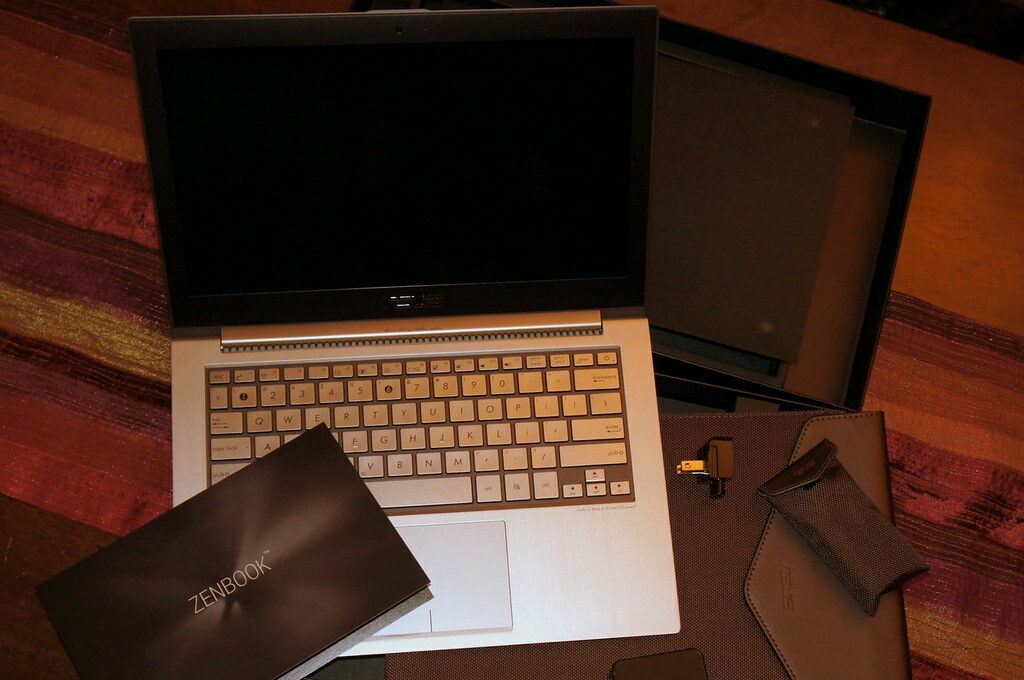
Which is best when it comes to Notebooks vs Laptop vs Netbooks vs Ultrabooks?
The world of portable devices on the market is a deep and complex world and it can feel like you are drowning in all of the possibilities. If you are in the market for a new portable PC device, your options can be overwhelming.
With so many products on the market these days, how do you know which is the best option for you? There are standard laptops, which seem like a safe bet. Then there are also notebooks. Is a notebook a better option?
You’ve also probably heard of netbooks. What are the benefits of netbooks? And what about Ultrabooks – what are those? What are the benefits and downfalls of all of these options?
It’s easy to become lost in the ever-changing, ever-improving world of portable PCs.
Never fear! Today I am going to take a dive into all of these options and give you a comprehensive look at the pros and cons of each as well as which device is best for different types of uses.
I’ll make sure you can make a confident decision by finally answering the oft-asked question.
Laptops

I think most of us are aware of what a standard laptop is, but this term covers a range of portable computers with varying abilities so I want to spend just a minute here.
Today’s laptops can truly have all of the power and performance of a desktop PC but in a more compact machine. If you are pricing laptops in a store or online, you will quickly see that the price tags have an extremely wide range.
You can find laptops starting at $200 and then there are some that can cost up to $8,000. That range can be startling and a bit nerve-wracking when it comes to choosing an option. Keep in mind that the price tag on a laptop is generally based on the machine’s abilities when it comes to performance, design, and storage.
A cheaper laptop option will generally run more slowly, be a bit more bare-bones when it comes to design and functionality, and will be limited in storage space. In turn, a laptop with a larger price tag will have a lot more speed and power, will generally have more aesthetic appeal and functionality, and will likely come with a lot more storage.
The variety in standard laptops is something to keep in mind when you are weighing out what type of device is best for you between standard laptops and other portable options. The benefits of a standard laptop versus some of the lighter and more compact portable PC options on the market are, first, that they are generally larger.
This may not seem like a benefit since the rule of thumb in technology is that smaller is better.
However, if you like to have a good amount of screen space and a more comfortable typing area, laptops will provide that comfort for you. Another benefit is that laptops will have higher performance options and functionality than that of their more portable cousins like notebooks and netbooks.
Laptops generally have between 8GB and 16GB of RAM and contain much higher performing processors than that of more portable device options. Standard laptops generally still reign supreme when it comes to uses that require more performance abilities.
Laptop Pros
- Larger screens and keyboards for easier use
- More power and performance options
- High functionality options
Laptop Cons
- Larger and heavier
- Less portable
Best Uses
Due to laptops’ higher performance capabilities, the sky is the limit for what functions can be performed. Some functions include:
- Gaming
- Streaming
- Web surfing
- High performance business use like running multiple applications at once
Related:
Notebooks

Starting in the late 1980s, notebook laptops hit the scene.
They were marketed as lighter, sleeker, and more compact than the average laptop. Their compact size was evidenced by their name which compared them to the size and weight of a paper notebook.
Today, the size and weight differential between a laptop and a notebook still rings true. While standard laptops generally come with screen sizes between 10 inches to 18 inches and overall weight between 4 and 8 lbs, notebook laptops have screen sizes under 15 inches and generally weigh less than 5 lbs.
The lightweight and compact notebook can easily fit in backpacks, large purses, etc. while the standard laptop is more difficult to travel with. The smaller size of notebooks, however, generally means that the performance capabilities are a bit less than that of a standard laptop.
The average notebook operates on 4-8GB of RAM and a 128-256GB SSD which is considerably less storage and power than a standard laptop, but still enough to function for general and business use.
Notebook Pros
- Smaller and lighter
- More portable
Notebook Cons
- Less power and performance than a standard laptop
Best Uses
- General and business use
- Word processing
- Web surfing
Which is the better, a laptop or notebook?
As stated, with smaller sizes and lighter weights, you will start to see less power and performance options in notebooks.
If you plan on performing functions on your machine that require high processing power or graphics capabilities, you may want to rethink the notebook option.
For example, if you will be using your machine for functions like PC gaming, video editing, graphic design, or other uses that require multiple applications to be open and running simultaneously, you will need a lot of power and performance.
There are definitely some notebooks on the market that have a good amount of power, but standard laptops still have the most performance capabilities and would be your best bet for some of those high-power functions.
However, if you are using your machine for more general and you will be towing it around with you wherever you go, a notebook is a better option as a laptop can be cumbersome to transport.
Netbooks

Netbooks hit the market and started to gain notice in 2008.
They have screens that are generally less than 12 inches and weigh between 1 and 3 lbs. They are wildly portable, even more so than notebooks, and are great for on-the-go accessibility. These devices are typically not intended to function as your primary computer but, rather, to offer you a very portable secondary option to your primary PC.
To put it simply, netbooks are a stripped down version of laptops and their purpose is to allow users a mobile but very limited experience. Their lightweight nature makes them super-portable and they are efficient for functions like light internet surfing, checking emails, and word processing.
Netbooks generally operate with less than 4GB of RAM and a 16GB solid-state hard drive so their performance capabilities are noticeably lower than that of both standard laptops and notebooks.
They fall a bit short if you are looking for any higher processing functions like streaming or heavy business use. If you are looking for a simple and portable option in a secondary device, netbooks are the cheapest option when compared to laptops and notebooks as they typically cost between $300 and $600.
Netbook Pros
- Very small and light
- Extremely portable
- Affordable price
Netbook Cons
- Limited power and performance
- Limited functionality
Best Uses
- Word processing
- Web surfing
Which is better, laptops or netbooks?
Some of the same factors that we discussed between laptops and notebooks come into play with netbooks but to more of an extreme.
When it comes to the better option in a device between laptops and netbooks, the answer will depend on your intended use. Netbooks are great for doing simple functions and are excellent for mobility as they are small, compact, and can fit in a purse or small backpack.
However, they are not built to accommodate high-performance uses that can be done on a laptop. While laptops are bulkier and less portable, their power and functionality are much greater than that of a netbook.
Netbook vs Notebook?
Again, a netbook will be your best option if your primary concern is portability and you only want to perform basic functions on-the-go.
If you are looking to use the device for slightly more advanced functions like gaming or general business use, a notebook would be the better option as it is still relatively portable but offers more ability for higher level use over a netbook.
Ultrabooks

An Ultrabook is an Intel original device and it combines the high performance capabilities of a premium standard laptop with the lightweight compact benefits of a notebook.
It has an Intel Core i3, i5, or i7 processors as well as Intel’s fast storage.
While Ultrabooks are offered in several different brands, Intel has set the standards for this breed of portable PC fairly strictly so there are a few requirements for a device to be considered an Ultrabook.
First, there are size requirements. A device is considered an Ultrabook if it is 18mm thick for smaller screens or 23mm thick for screens larger than 14 inches.
Second, Ultrabooks need to be able to run for at least five hours on one charge and they also come equipped with Intel’s hardware so the performance is higher than the average notebook and often matches that of a standard laptop.
They can get a bit pricey due to the combination of their premium performance and they can range anywhere from $500 to $1000.
One other downfall of Ultraooks is lack of variety. Since standard laptops have been on the market much longer, they span across many different brands and offer much more variety with regards to functionality, aesthetics, and price.
Ultrabooks are considered by Intel to be the “up and coming” new normal when it comes to portable PCs so I think they will eventually catch up to the variety on the market for standard laptops.
Ultrabook Pros
- Compact, lightweight
- High performing
Ultrabook Cons
- More expensive
- Less variety
Best Uses
- Gaming
- Business
- General Use
- Streaming
Ultrabooks vs Laptops vs Notebooks
The primary difference between Ultrabooks and standard laptops are that Ultrabooks are known to be more lightweight and compact.
Generally speaking, high performance and functionality exist on both options. Ultrabooks do tend to be pricier when you compare an Ultrabook to a laptop with similar specs.
While Ultrabooks match the portability and lightweight aspects of notebooks, Ultrabooks are higher performing than notebooks and have much more functionality.
Conclusion
So what does it all boil down to? If you are looking for all of the functionality that can be found on a desktop PC but want the option to be mobile if necessary, a higher level standard laptop PC is going to be your best option.
If, however, mobility and portability are the most important factors to you, you will want to look at your options between notebooks, netbooks, and ultrabooks.
Be sure to consider your budget and your intended use between these options, though.
As we’ve discussed, pricing ranges widely between these options and certain higher-level uses are simply not possible on the ultra-portable netbooks. If you are looking for slightly more functionality but you still absolutely need a portable option, a notebook or an Ultrabook is where it’s at for you.
Netbooks are still a great option, though, as a secondary device for light but portable use. Your decision between a laptop, a notebook, a netbook or an Ultrabook will depend entirely on your intended use.
You definitely don’t want to decide on your purchase and then realize that your new device does not meet your needs. Be aware of your needs, be picky about functionality, and don’t be afraid to mull it over when it comes to your new device.
Related:

Be the first to comment